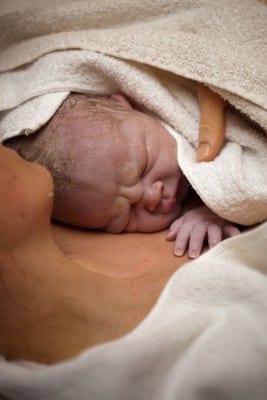
PTSD is a condition most commonly associated with war, but it can be caused by almost any traumatic experience or event. For some women, childbirth is traumatic enough to cause PTSD, the researchers from McGill University say.
“There’s a perception that post-traumatic stress symptoms result an event that’s unusual or outside the realm of normal human experience,” said Deborah Da Costa, a McGill psychologist who co-authored the study. “But there are things that can happen in the birthing process that can make a woman feel like her life or her baby’s life are in jeopardy. She experiences helplessness, fear, horror. That’s enough for an experience to be traumatic.”
To meet the criteria for PTSD, symptoms from three categories must be exhibited by patients: re-experiencing the trauma through nightmares, flashbacks or vivid recollections; avoidance tactics (for mothers, this could mean avoiding hospitals or detachment from their babies); and heightened “arousal,” like insomnia, irritability or jumpiness.
The study, which followed 308 women before and after birth with the use of telephone questionnaires, concluded that as many as one in 13 mothers experienced full-blown post-traumatic stress disorder in the weeks after delivery. More specifically, almost 8% of the women met the definition of PTSD one month after birth; this declined to 5% six months after delivery. Nearly 17% experienced flashback-like symptoms with at least one other symptom.
A separate diagnostic took that relied on interviews with patients and clinical judgments made by researchers concluded that the numbers were much smaller; only 1% of the women were found to have full PTSD and 3.2% experienced some symptoms one month postpartum. Dr. Da Costa believes the large difference is due to the fact that women may be afraid to disclose certain symptoms to health care workers.
Despite the gap in diagnostic results, all women linked their trauma to the childbirth experience and all of their symptoms started after delivery. Women who had reliable support systems were least likely to experience PTSD than others. Women who had been sexually assaulted at some point, seemed to be at a higher risk for PTSD. Dr. Da Costa believes this may be due to the fact that delivery happens in and around the sexual organs.
Dr. Gail Robinson, a University of Toronto psychiatry professor who specializes in mental health, acknowledges that PTSD after birth is a reality, but she doesn’t feel it’s a “huge” problem. She says that while it is true that sexual assault victims are at a higher risk, something very scary usually happens during the delivery process to trigger the condition.
“Sometimes people go along and they think they’re going to have a normal delivery and all of a sudden, there’s a crisis, and they’re rushed into the OR and there’s great fear,” Robinson said. “Or they think they have a normal delivery and six hours later there’s a lot of hemorrhaging. And the whole thing is associated with a lot of pain.”
Whether this is a “huge” issue or not, it is definitely one that deserves some attention. PTSD is a real condition; it is a condition that can damage relationships permanently. Dr. Da Costa says that knowing which patients are at risk can help ensure that proper care is received before, during and after delivery.
Related Articles:
- Three-Week-Old Infant Found in a Ditch; Mother Taken into Custody
- NY Foundling’s Mother/Child Program Designed to Give Pregnant Teens a Brighter Future
- Pregnancy Complication Risks Increased for Women Born Prematurely






